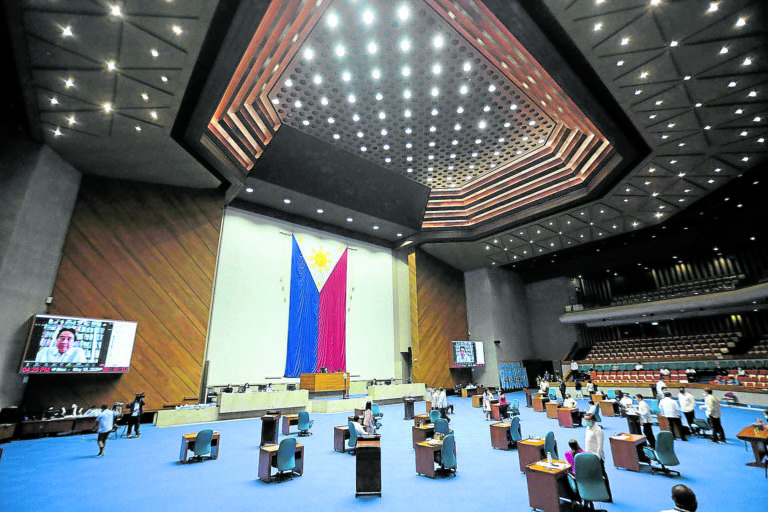Lawmaker bats for mandated child support; wants ‘deadbeat parents’ punished

File: Members of the House of Representatives convene for a session in this May 18, 2020 photo. | INQUIRER PHOTO / GRIG C. MONTEGRANDE
MANILA, Philippines — Irresponsible parents will be compelled to give child support and be punished for skipping it if a lawmaker’s proposed measure becomes law.
House Bill No. 44, filed on June 30, aims to mandate child support of not less than P6,000 and sanction neglectful parents by barring them from applying for new passports, drivers’ licenses, and other documents, according to its author, Northern Samar Rep. Paul Daza.
Under the bill, a parent who is required to pay child support but willfully fails to pay for two months or more than P30,000 will be held liable. In addition, first-time offenders will be subjected to probation, while repeat offenders may be imprisoned for two to four years and fined at least P100,000.
“In other countries, this is called the Anti-Deadbeat Father Act. In the case of parents here in the Philippines, 95 percent of neglectful parents are men, but there are also women. The bill is written not to be discriminatory. This is as responsible parenthood for fathers and mothers,” Daza, speaking in a mix of Filipino and English, explained during a press conference on Monday.
“If the parents are not responsible, the law will mandate that they give child support. That’s already in the law, but it’s not being enforced. So this bill will put more teeth in the law, and would even allow government agencies, once it’s established that you need to give child support that you’re not giving, the government can withhold issuance ng passports, driver’s license,” he added.
Even parents abroad who have left behind their families to fend for themselves cannot disregard the requirement should the bill be signed into law. The bill has a provision that would allow the government to coordinate with other countries in penalizing — or even extraditing — the violator.
“All of these will be discussed in the committee. As the principal author I’m open to improving the provision, but there is such a system,” he added.
Daza said he found the bill necessary as the World Health Organization (WHO) estimated in 2018 that around 14 million households in the Philippines only had one parent – about 95 percent of them female.
He also made clear in his bill’s explanatory note that, despite existing laws — like the Solo Parents Welfare Act and the Violence Against Women and Children Act — there is still a need to help broken families cope with economic needs.
“For example, while RA 8972 [ Solo Parents Welfare Act] provides special privileges like discounts, leave credits, and flexible work schedule for solo parents, what these parents need more is an increase in their purchasing power, which can be done by compelling non-custodial parents to contribute toward their child’s basic necessities,” House Bill No. 44’s exploratory note states.
“Seeing the important role of non-custodial or absentee spouses/partners in raising healthy and secure children, there is a need to enact a child support enforcement law. This proposed law will have more teeth than any other similar existing or proposed law,” it also says.
House Bill No. 44, Daza said, would also prevent the practice of solo parents skipping mediations due to aversions to legal proceedings as disputes can be settled within the Department of Social Welfare and Development.
And if parents don’t a good source of income, the government will help them find a job so they could meet their obligations.
Daza also clarified that under the bill, the provision of child aid is mandatory and not optional — even if the custodial parent or the person who chose to stay with the child would not want to receive money from the former partner.
RELATED STORIES
DSWD chief warns negligent fathers
Solo parents get P1,000 monthly, more perks under new law
New ordinance promises more benefits for solo parents in Cebu City
Disclaimer: The comments uploaded on this site do not necessarily represent or reflect the views of management and owner of Cebudailynews. We reserve the right to exclude comments that we deem to be inconsistent with our editorial standards.
